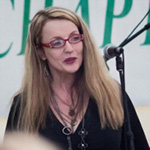Elemental
Elements are mercurial—so is glass, which is liquid, not solid. It’s deceptive, like my breasts. It looks solid, but it’s not. They look real, but they’re really not. Think mirrors, thermometers, Mercury with his caduceus. If you squint, caduceus looks like cadeau, the French word for gift. Each day is a gift is a platitude my pharmacist told me—language I prefer to ignore. Mercury’s the god of lies as well as medicine.
While I was lying in the MRI the first time, I tried to remember the periodic table. Alkaline metals are the first group—hydrogen lithium sodium potassium rubium cesium…Hydrogen and helium are in the same period—H and He, the first period. In school my first-period classes were PE, Physics, Chemistry, and Calculus. Holly Hawes was in all of my first periods, and she died of breast cancer. My first period was New Year’s Day 1974, during the Rose Bowl Parade. I don’t remember my last period. Chemo stopped it.
Later, in the PET scanner, I catalogued alkaline earth metals—beryllium magnesium calcium strontium barium radium—somewhat reactive. I reacted to my first period with joy and a sense of relief. Maybe now, I thought, I’ll get breasts. I had breasts for the next 42 years. Then I had one, then none, then two. My torso was curved, then Amazon, then flitter-flat, then round again.
I don’t remember much about chemistry except for Coach Mac and the periodic table. Chemotherapy was periodic. Poison was pestled to perpetuate me. Sometimes I wanted to die. Sometimes I didn’t. Coach Mac made elements and compounds clear as water, two hydrogen, one oxygen. Patterns were easy when he explained them. Sometimes I wanted to live. Sometimes I didn’t. That was a pattern I started to recognize.
I never loved the earth, until I thought I might not see it. I never loved the air and never thought about it, never worried about breathing, until I showed the scars to my lover. I don’t remember all he said, just Don’t worry, so of course I held my breath and did. Louis was a pharmacist, and he left me. After that secession, I decided on reconstruction and against being an Amazon.
My scars resemble the Phoenician letter for hook, which became our alphabet’s Ff, Uu, Vv, Yy, Ww. The letters are paired, the way my breasts came back. They’re perfect now. The scars still feel as though there’s a fishhook tugging at each nipple.
I was the exception to the elemental rule of the operating table. I awakened, came up through air, then went back under, like a fish snagged on a line. I was baptized, I reacted, I was reactive, I was radioactive. I went flat but didn’t flatline.
When my breasts—or rather the cage of ribs where breasts were and would be again—were outlined with radiation tattoos, they looked like the Phoenician symbols for wheels—round with quadrants, like not-so-little hot cross buns. What was that old rhyme—some like it hot? some like it cold? Radiation therapy burned, then I was cold for weeks and weeks.
I used to be so jealous, wrote a friend. You were the one with boobs. Was that meant to flatter? Well, reconstruction made me flatter before I was rounder. I wore tissue expanders for months. I mummified my breasts in Ace bandages for nearly a year. She wrote, Did vanity make you have surgery? There’s an element of truth in that. Is it vanity to want a silhouette? To want a lover, one who wants you back?
The mercury glass on my bubble mirror tarnishes like sterling, blotches black with bloom (shadows doubly shadowed on my mammogram). Here are my breasts—dimpling, scarred. My nipples look like a puddle pocked with rain, concentric circles (a dartboard on the diagram the plastic surgeon drew).
Dame Fortuna’s a wheel, and I hope I’m on the upswing now—or some element of that gondola ride through the air. My oncologist tells me, Things are looking up. I look up my horoscope—Cancer, today’s a good day for love. The zodiac elements are fire, water, earth, air. I’m water. The last three men I loved were water. My best love was fire, and we burned and we quenched.
Now that I have newer breasts, people look at them. I don’t know whether it’s admiration or investigation. When I look at my breasts these days, it’s mostly in the mirror, when I’m brushing my hair. It’s grown in, it’s grown long, it ripples to the small of my back. Most days I wear it loose. That pharmacist called me six weeks ago, but I didn’t pick up. Not reacting is also an answer.

Cleave, Pamela Johnson Parker’s first poetry collection, won the 2017 Trio Award (Trio House Press). Her poems and lyric essays appear in Iron Horse Literary Review, American Poetry Journal, diode, Poets and Artists, Gamut, Spaces, and Muscadine Lines. Parker’s poems are also included in the anthologies Language Lessons: Volume 1 (Third Man Press, Nashville) and Best New Poets 2011. Parker’s chapbooks are Other Four-Letter Words (Finishing Line) and A Walk Through the Memory Palace (Phoenicia), which won the inaugural Qaartsiluni Chapbook Prize.
Parker lives in Kentucky and works at Murray State University in the Department of Art & Design Department.
